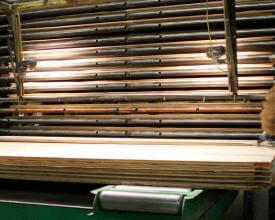DHA eNews – Hardwood Plywood Manufacturers Petition For Import Duties On 3 Countries
The future of the decorative hardwoods industry depends on clear leadership in the face of predatory trade practices from Asia, which will decimate our domestic industry and workers if not countered. On May 22, the Coalition for Fair Trade in Hardwood Plywood provided key leadership by filing a petition for antidumping and countervailing duties to counter unfair trade practices by Indonesia, Vietnam, and China. The industry supports fair trade—but that's not what we see from China and its allies.
The policy landscape continues to undergo dramatic change in the courts and from the Trump administration. New policies, backed by funding, will increase the timber harvest and reduce wildfire risk. These policies are more likely to be successful, as the Supreme Court has unanimously pushed back on attempts to kill projects like this through unending environmental reviews.
If you have questions or comments, contact me. I look forward to hearing from you.

Keith A. Christman, President

On May 22, the Coalition for Fair Trade in Hardwood Plywood petitioned for antidumping and countervailing duties to counter unfair trade practices by Indonesia, Vietnam, and China. These petitions, filed with the U.S. Department of Commerce and the International Trade Commission, have significant implications for the U.S. economy, in which hardwood plywood plays a critical role. The petitions stated that hardwood and decorative plywood manufacturers in Indonesia, Vietnam, and China are also dumping their products into the U.S. at discounted prices, with margins of up to 133.7% for Vietnam, 202.8% for Indonesia, and 474.2% for China.
PHOTO © TIMBER PRODUCTS
EU member states have urged the European Commission to establish a "zero-risk country category" within the EU's anti-deforestation regulation, the EUDR. The designation would exempt countries with minimal deforestation risk from the most stringent compliance and reporting obligations. The proposal won the support of 19 EU member states, reflecting a broad commitment to simplify regulations while protecting the environment.
The new National Active Forest Management Strategy aims to modernize forest management practices to meet the U.S. demand for timber, reduce the risk of wildfire, and support rural economies. It aligns with the executive order that directs the U.S. Forest Service to expand timber production and streamline regulations. The goal is to increase timber volume by 25% to 4 billion board feet while enhancing industry stability through long-term contracts, integrating forest management with fuel programs, and streamlining regulatory processes to reduce delays.
For decades, environmental reviews have been used to delay projects and development. The U.S. Supreme Court unanimously ruled to narrow the scope of environmental reviews under the National Environmental Policy Act. Now, federal agencies will assess only the direct environmental effects of a project instead of the broader indirect impacts. The decision should reduce regulatory delays, streamline timber sales and forest management, and accelerate wildfire prevention and forest restoration projects.
On May 29, USDA announced a $200 million investment to implement the U.S. Forest Service's National Active Forest Management Strategy. USDA stated that the new strategy is a key initiative that will increase timber harvest, improve forest health and productivity, reduce wildfire risk, and support rural economies.
On May 28, a U.S. trade court ruled that the global reciprocal tariffs set by President Trump are illegal, stating that he had exceeded his authority under the International Emergency Economic Powers Act. The decision temporarily blocked tariffs on imports from multiple countries.
On May 29, the Court of Appeals for the Federal Circuit granted "an immediate administrative stay," temporarily reimposing the 10% global tariffs and the reciprocal tariffs imposed on more than 60 countries. This also applies to the 25% duties on products from Canada and Mexico and the 20% tariff on products from China, set in response to a purported national emergency on drug trafficking.
New Zealand has increased exports of radiata pine logs to Vietnam as the two countries work together to increase Vietnam's exports of furniture. New Zealand's exports of timber to Vietnam have grown sharply in recent years.
Experts stated that EUDR country benchmarking appears deeply flawed. "Countries with long-standing forest governance concerns—Congo, Central African Republic, Papua New Guinea, South Sudan, Solomon Islands—were all marked as low risk, grouped alongside the likes of Finland, Norway, and the United States. The result is not just misleading—it actively undermines the regulation's credibility."
U.S. cabinet sales continue to decline. In April, the volume of cabinets sold fell by 15% vs. one year ago, while the dollar value fell by 9.3%. In her presentation at DHA's 2025 Annual Meeting, Betsy Natz, CEO of the Kitchen Cabinet Manufacturers Association, outlined the extensive damage caused to U.S. cabinet manufacturers by the high levels of cabinets imported from Asia and dumped—sold at less than fair market value—in the U.S. market.
According to the 2025 U.S. Houzz Emerging Summer Trends Report, wood drenching is one of the hottest trends in interior design. Wood drenching is where wood is used throughout a room—walls, floors, and furniture—to create a natural, cohesive look.
DHA member AHF Products has appointed Brent Emore as CEO, effective immediately. Emore, who most recently served as the company's chief financial officer and interim CEO, brings more than two decades of leadership experience in the flooring and building products industries. Congratulations!
We regret to inform you that Manfred Bohlke, founder of M. Bohlke Veneer Corp., died on May 20 at age 83. He "was a pioneer of the wood veneer business and a legend in our industry," stated Nick Bohlke, his grandson and the company president. "He will be greatly missed by all who know him."
A century of wildfire suppression policies has led to the buildup of dry, flammable material in forests, which fuels larger, more destructive, and more expensive wildfires. A new study shows that every $1 spent on clearing out excess fuel saves at least $4 to $7 in future firefighting costs. The study highlights the potential for reforming environmental protections to save money and improve forest health.
For the first time, fires, not agriculture, are the leading cause of tropical forest loss. Last year, wildfires accounted for nearly 50% of forest loss. Data provided by Global Forest Watch showed that more than 16 million acres of tropical forests were lost in 2024, more than double the amount lost in 2023.
A Vermont wood products manufacturer, JK Adams, is one of the beneficiaries of a grant from the Vermont Working Lands Enterprise Initiative, a program that provided more than $679,000 to Vermont farms and forestry businesses. JK Adams' grant will help fund the in-state acquisition of Vermont hardwoods.
Which of the following are actually trees: palm, bristlecone, Brazilian grape, banana, giant baobab, or Joshua?





